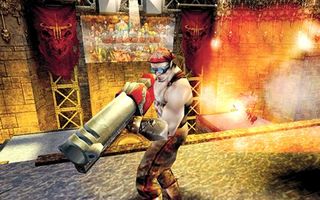The father of FPS
A quick chat with ID, Doom and Quake Live creator, John Carmack
PC Gamer: What makes a free-to-play, browser-based game, Quake Live, special enough that id has focused so much energy on it?
John Carmack: Really it’s a matter of looking at how the PC market has changed. Up until our last project, id Software was very much a PC game company. We built Doom 3 as a PC project. As we look at it today, we really can’t justify doing a mainstream action-heavy title as a PC-only game. But there are still things that the PC does better than consoles. The browser environment is faster—navigating web pages on the console is a really tedious experience. The keyboard/mouse interface is definitely still the superior interface for a competitive first-person shooter experience, much better than an analog joypad. And I do think there’s the whole idea of PCs being everywhere, and having a game that you can play just about anywhere. Anywhere there’s a PC, if you’ve got a few minutes you can download Quake Live content and jump in and play your game.
If you took the same game and spruced it up to modern graphics and put it on the consoles, it just wouldn’t be as good an experience. That’s one of the aspects of engineering that’s always appealed to me: trying to do the right thing in the right place. You don’t try and push something where it no longer belongs. You look for opportunities in all the things that you have available.

PCG: It’s interesting that the games you play don’t always reflect the games you make. You’ve always stated that you’re interested in the aspect of pure fun, rather than narrative.
JC: Well, right now I’m playing Super Paper Mario. I’m working my way through the entire length of that with my son, and having a good time with it. To some degree it helps me with the technological distance there. It’s a cartoon. And I have an easier time with narrative in a cartoon than with games that are fuzzing the line between what you’d see in a movie and a game.
I have more difficulty, in some strange way, when it’s right up my alley of the technological things that I’m doing. I find myself more focused on, “Oh, they botched the shadow calculations on this.” Or, “This light is incorrectly rendered.” And that’s distracting for me on a lot of levels. But I can look at Mario and Luigi and be just fine taking in a story.
PCG: How do you see the PC’s role in the future of gaming?
JC: There are definitely days when I wish we could just focus on the PC, and do bleeding edge stuff on there. There are interesting technical things, looking across the spectrum of graphics cards, looking at the very latest stuff on there, but there are also times when I say, “Wow, the 360 is a nicer place to develop games.” You bypass a lot of the issues there. Wouldn’t it be nice just to develop strictly for that platform.
As far as future research, there’s interesting things where—as we look toward the next generation of console development—most of these technical trends will be preceded by earlier versions of them on the PC. And we’re certainly looking at CUDA programming, Larrabee prototyping, as AMD looks toward Fusion, those are all things where we use the PC as an early sounding-ground for what the more dominant (sales-wise) consoles are going to eventually wind up being.
November 24, 2008
Sign up to the GamesRadar+ Newsletter
Weekly digests, tales from the communities you love, and more
Most Popular


